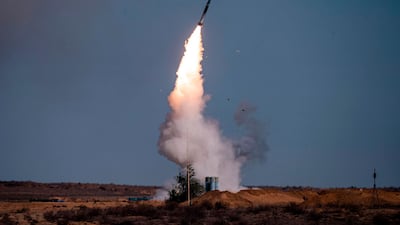On Monday, the US sanctioned Turkey, a fellow Nato power, over its procurement of the Russian-made S-400 air defence missile system. Ankara first purchased the system in 2017, provoking much ire in Washington. The new sanctions are designed to avoid wider damage to Turkey's fragile economy, focusing instead on the country's defence establishment.
Sparing Turkey's economy gives both nations room for de-escalating tensions at some point in the future, and US State Department officials have said they hope the Turkish government will engage in finding a solution. Nonetheless, it is the most meaningful statement yet of American discontent at the direction in which Turkish President Recep Tayyip Erdogan has been taking his country. It is also perhaps the most significant rift to emerge within Nato in years.
In addition to the S-400, there is a host of other disagreements between the two countries. The US has also taken action against Turkish banks for helping Iran dodge American sanctions. Mr Erdogan has criticised US support for Israel, as well as Washington’s refusal to extradite Fethullah Gulen, a Turkish cleric whom Ankara blames for a coup attempt against Mr Erdogan in 2016.

Turkey also deeply opposes US support for the Syrian Kurdish YPG militia, a group that it deems a terrorist organisation. Since 2016, Turkey has on three separate occasions forayed into northern Syria to target the YPG, even as the group’s officers were supported by US military advisers and while it was playing an important role fighting extremists. This happened most recently last year, after which US President Donald Trump, who normally sought good relations with Turkey's Islamist president, threatened in a tweet to "obliterate the Economy (sic) of Turkey".
On top of this, Mr Erdogan's politics have alienated the EU. European leaders are preparing to place sanctions on Turkey, though they will not have the same bite as the American sanctions, given the dollar's supremacy in international markets. EU measures are expected to target people involved in Turkey's controversial energy exploration expeditions into the eastern Mediterranean earlier this year.
Mr Erdogan’s path renders such responses from great powers inevitable. It was not always this way – for a long time Turkey was seen as a reliable and vital Western ally. In the early days of Mr Erdogan's presidency, Turkish accession to the EU was a realistic and much-anticipated prospect. Today, it is at most a counterfactual thought experiment.
The damage to Turkey, as well as to the geopolitical interests of its Nato allies, from Ankara’s decline will be long-lasting unless Mr Erdogan’s course is reversed. In the meantime, it weakens the multilateral spirit needed to deal with issues like the migration crisis, in which Turkey plays a vital role, given its geographical location and generous hosting of an estimated 4 million refugees as of 2020.
The West and the Middle East alike need Ankara’s constructive involvement in fighting international terrorism, revitalising the regional economy and creating a more stable and prosperous environment for the region’s people. That does not appear to be the path chosen by its current leadership. Turkey is a nation that straddles two continents, but it can offer nothing to either if its leaders insist upon setting it adrift.


